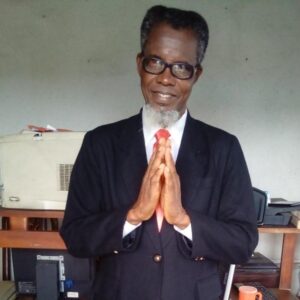BREATH OF DESPAIR

In the heart of Nigeria, where faith and spirituality intertwine with the fabric of daily life, a tragic incident has unfolded that leaves us grappling with the boundaries of belief and the sanctity of Life a man, clutching the holy Bible as if it were a talisman against the harsh realities of existence, entered a hospital ward with a conviction so fervent that it eclipsed reason. In a moment that can only be described as both heartbreaking and bewildering, he removed a patient’s oxygen mask, believing that his faith alone could conjure healing from the depths of despair. The result? A life extinguished, a family shattered, and a community left to ponder the implications of such fanaticism.
This incident is a stark reminder of the delicate balance between faith and fanaticism. While faith can be a source of strength and hope, it can also morph into a dangerous delusion when it overrides the fundamental principles of medical science and human compassion. The man’s actions, though perhaps rooted in a desire to help, reflect a profound misunderstanding of the complexities of health and illness. In this case, the line between belief and recklessness was tragically blurred, leading to an irreversible consequence.
Who, then, should bear the weight of blame in this heartbreaking scenario? The man, driven by an unwavering conviction, certainly holds a significant portion of responsibility. However, we must also consider the broader societal context that nurtures such extreme beliefs. In a country where religious fervor often overshadows critical thinking, the environment can become fertile ground for dangerous ideologies. The lack of adequate mental health support, the prevalence of misinformation regarding medical practices, and the glorification of faith healers all contribute to a culture where such incidents can occur.
To prevent such tragedies from recurring, we must advocate for a multifaceted approach. First and foremost, there is an urgent need for comprehensive education that emphasizes the importance of medical science alongside spiritual beliefs. This education should not seek to diminish faith but rather to harmonize it with an understanding of health and wellness. Workshops, community discussions, and collaborations between religious leaders and healthcare professionals can foster a more informed populace.
Moreover, mental health resources must be made more accessible. Many individuals turn to extreme measures out of desperation or a lack of understanding of their circumstances. By providing support systems that address mental health, we can help individuals navigate their struggles without resorting to harmful actions.
Finally, it is imperative to cultivate a culture of accountability within religious communities. Leaders must be encouraged to speak out against practices that endanger lives, promoting a message that faith should never come at the expense of health. By fostering an environment where questioning and dialogue are welcomed, we can begin to dismantle the dangerous ideologies that lead to such tragedies.
In addressing the hospital occurrence, it is important to recognize that if an incident occurs, management must be held accountable. Hospital management plays a crucial role in ensuring patient safety and quality of care. Their oversight and leadership are critical in preventing such occurrence and ensuring accountability within the institution.
In conclusion, the heartbreaking incident in Nigeria serves as a poignant reminder of the need for balance between faith and reason. It calls for a collective effort to educate, support, and hold accountable those who wield the power of belief. Only then can we hope to prevent the loss of life to the whims of fanaticism, ensuring that faith uplifts rather than destroys.
Suthag Charity Foundation Reacts to a matter of public interest
By Amb. Dr. Samson Joseph Iriruaga.




